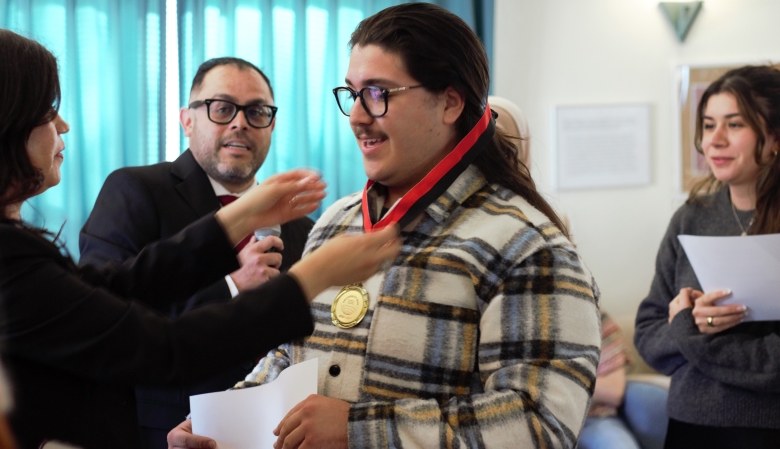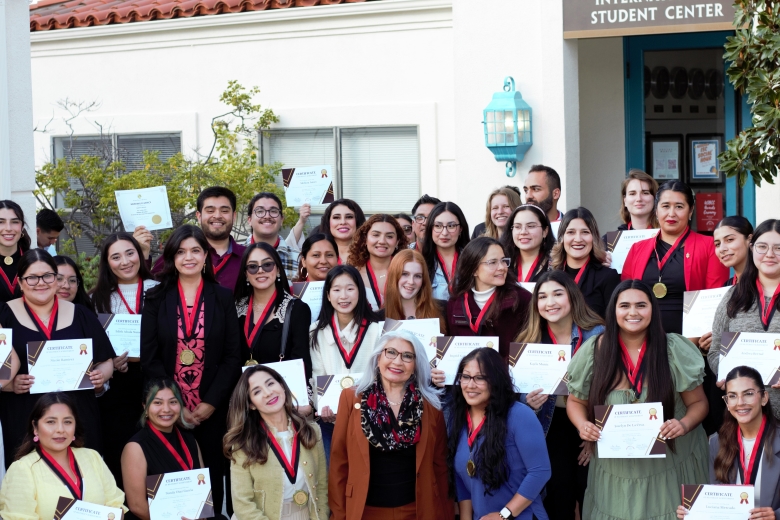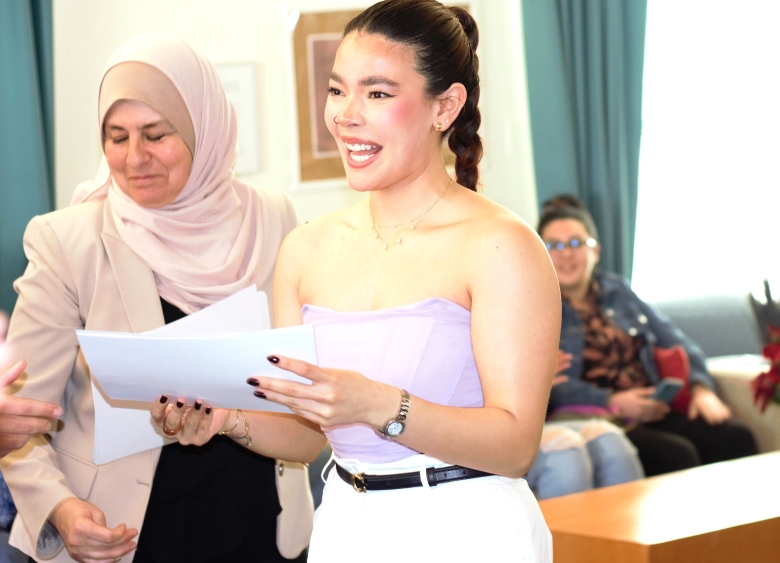Students, families celebrate University Seal of Biliteracy and Cultural Competence awards

When San Diego State University launched its innovative University Seal of Biliteracy and Cultural Competence (USBCC) program four years ago, only three students took the exam and earned the recognition, all for Spanish.
This year, more than 80 students and staff received their USBCC certificates across seven languages. They packed SDSU’s International Student Center earlier this month, celebrating the accomplishment with faculty, family, and friends.
The ceremony spotlights the growing traction for the USBCC, the first higher education level university-wide program of its kind.
The USBCC is a digital badge that SDSU students can earn by participating in a cultural and linguistic immersion experience and demonstrating working proficiency in four domains: reading, writing, speaking and listening skills in a second language. The cultural and language immersion component may include an abroad experience or participation in global cultural research, activities, and events.
 Open the image full screen.
Open the image full screen.The goal is to honor and recognize students’ dual language fluency and cultural sensitivity in an increasingly global workforce, said Cristina Alfaro, SDSU’s associate vice president of International Affairs.
“When we talk to Fortune 500 companies about hiring, they are looking at how people work together, how people collaborate, how they understand and have empathy for each other’s lives, and a deep understanding of cultures and languages. The top skills employers are looking for include multi-geographical, multicultural, and multilingual knowledge and understanding for a global ready workforce, ” she said.
Cynthia Aguilar, a junior at SDSU studying bilingual education with an emphasis on multi-subject teaching, is a heritage Spanish speaker who grew up attending schools in both San Diego and Tijuana.
 Open the image full screen.
Open the image full screen.She views the USBCC as physical documentation that proves to employers not only that she is bilingual, but also that she has the cultural sensitivity to understand the hurdles facing migrant children.
“They will see that I am truly prepared to teach children that come from different backgrounds,” she said, “not only Mexico but children from other parts of the world because I understand how (kids) feel coming into a new country, and I can relate to them about being in a new culture.”
This year’s USBCC recipients span a variety of majors, said Alfaro, including social work, public health, biology, nursing, education, criminal justice, Chicano/Chicana studies, anthropology, psychology, computer engineering and international business.
"Given that we are a federally designated Hispanic Serving Institution with more than one third of enrolled students coming from Latine backgrounds and on the border of California and Mexico, a majority of our Seals have been in Spanish. However, this year we expanded to other languages such as: Arabic, French, Japanese, Chinese, Vietnamese, Tagalog, and many others,” said Alfaro. “We have the ability to award the USBCC in over 50 languages.”
 Open the image full screen.
Open the image full screen.In California bilingual education suffered a setback in 1998 after the passing of a restrictive language policy that required learning in English only. The measure was repealed in 2016, with renewed support for bilingual education. Additionally, the California Department of Education has elevated biliteracy education through the 2030 Global Multilingual California initiative.
Alfaro pointed to a comment made by previous USBCC recipient Catalina Solis, a SDSU College of Business graduate.
“I have come to realize that language loss carries a heavy emotional toll for those of us who experienced the shift to the dominant language (English) and were coerced to deny our heritage language in the process of schooling. Earning the USBCC has helped me to powerfully reclaim my language and my cultural identity.”
Efforts to resurrect the value of bilingualism started even before the law’s reversal, however. In 2012, California became the first state in the nation to offer a State Seal of Biliteracy for high school students who achieved proficiency in one or more languages in addition to English. Today, all 50 states and the District of Columbia provide a Seal pathway. In California, more than 465,000 high school students have been awarded the State Seal of Biliteracy.
Alfaro was part of the grassroots effort to create biliteracy pathways for the high school programs, and she championed SDSU’s efforts to develop a rigorous, university-level biliteracy Seal with consistent standards. SDSU published a handbook as a tool for other universities across California and the nation to create their own programs.
The USBCC aligns with SDSU Global Strategic Plan to be a leading internationally connected institution. Laura Martinez Hernadez went to school in both Mexico and the U.S., and Spanish was the primary language spoken at home. A junior studying Chicano/Chicana studies at SDSU, she learned about the Seal through her dual language education classes. She is confident that the USBCC will help when she enters the workforce.“It is not a requirement to earn the Seal, but it will be good no matter what career path I take,” she said.

